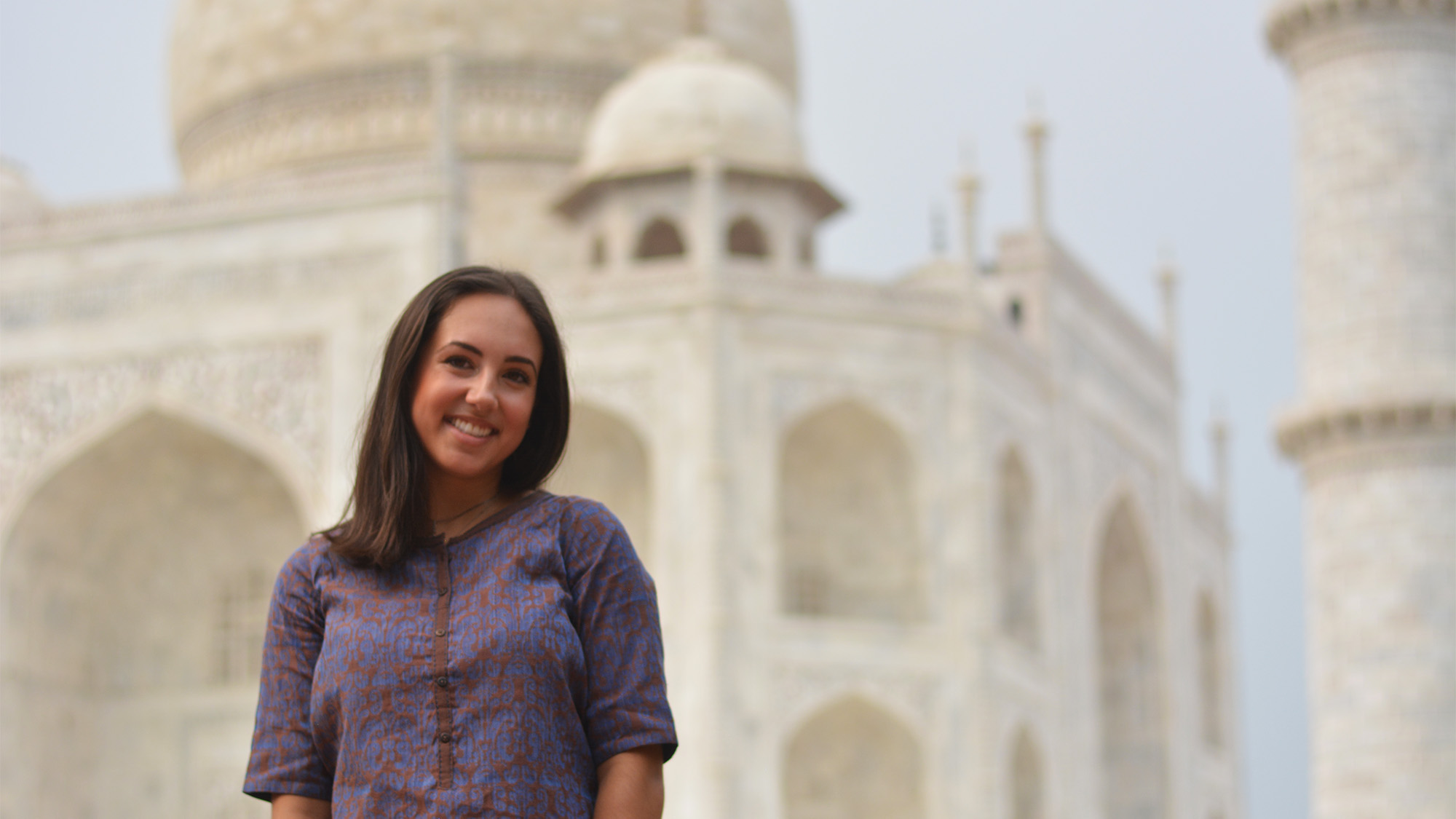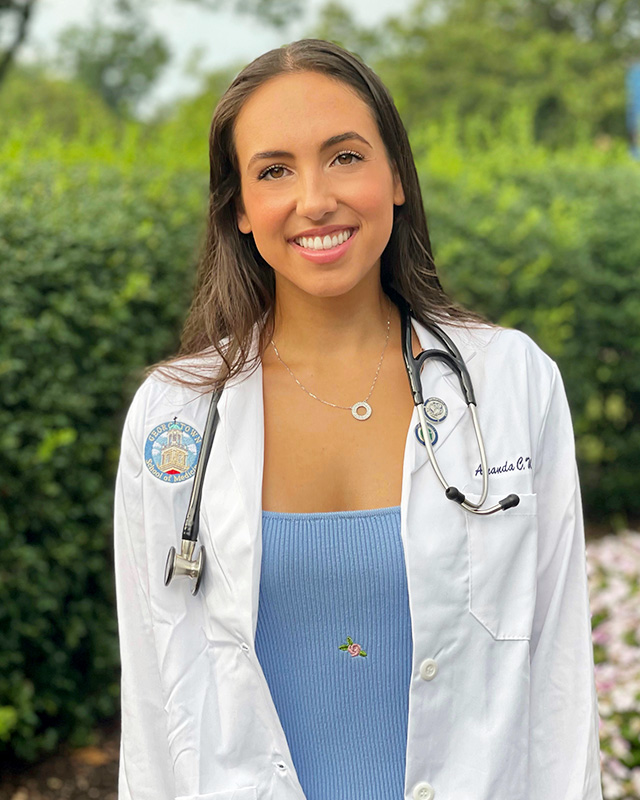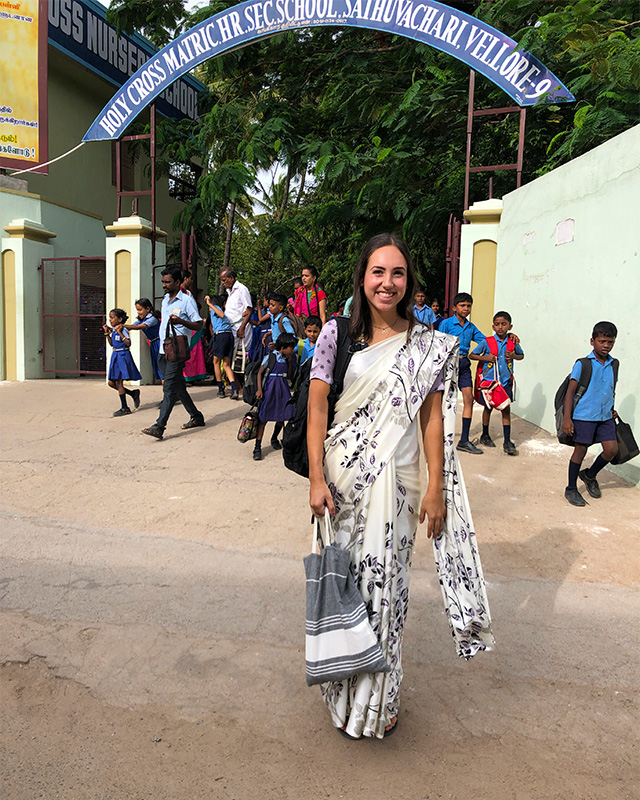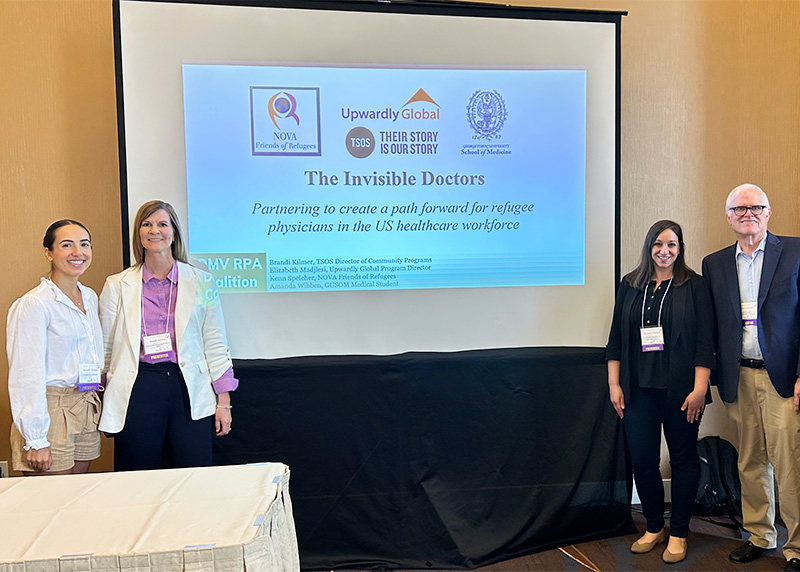School of Medicine Scholarship Recipient Dedicated to Serving Local Communities and Fighting Global Health Inequities

Posted in News Stories | Tagged Lawrence Dean Scholarship, scholarships, student achievement, student experience
(February 2, 2024) — For Amanda Wibben, MTS (M’26), the 2023-2024 Lawrence Dean Scholarship winner, cura personalis is about health care providers not only caring for their patients in their entirety, but also confronting their own privilege.

The Lawrence Dean Scholarship is awarded to a rising second-year medical student who has shown a dedication to Georgetown’s values while excelling academically. The scholarship provides full tuition and fees for the selectee’s second, third and fourth years of medical education.
“I think about cura personalis as a challenge to the person providing the care to always keep in mind how you are treating the person in front of you, beyond just the science and biochemistry,” said Wibben. “This includes thinking about all of the social aspects of life that might be presenting in front of you to understand what might be impacting the patient and their health.”
Lawrence Dean was a member of Georgetown University School of Medicine’s Class of 1973 who died prior to his graduation. Walter Bonner, a close personal friend of the Dean family, established the scholarship in Dean’s honor at the School of Medicine in 1976.
A Growing Interest in Medicine and Jesuit Values
Wibben’s interest in medicine initially developed in high school after watching her father go through surgeries and physical therapy following a bike accident. She wanted to learn more about his treatment and shadowed a local physical therapist and spinal surgeon.
“I really enjoyed seeing the whole spectrum of patients that needed spinal surgery: elderly patients, war veterans and truck drivers,” said Wibben. “I was applying to college at this time and decided to take pre-med classes when I started at my undergraduate institution, Holy Cross.”
The Jesuit approach to education and service at Holy Cross resonated with Wibben, whose interest in medicine grew throughout her college experience, prompting her to volunteer at a hospital and women’s home near campus.

“By my junior year, I knew I wanted to go to medical school, but I also realized I wanted to take some time to explore other interests before committing my life to medicine,” she said.
Wibben spent the first year after graduation on a Fulbright scholarship teaching English full-time in India and volunteering at a local child care center.
“My time in India put into perspective the privilege I had,” she said. “My mom immigrated to the United States from Cuba, and I kept thinking about the opportunities I was given because they left.”
Returning to the U.S. at the start of the COVID-19 pandemic also illustrated the inequities present in global health.
“I watched as hospitals in India ran out of oxygen for patients with COVID and listened to my friends there contemplate getting the Sputnik vaccine, as they had no other available option,” said Wibben, who also observed many other differences. “I saw how different health care could be in different parts of the world when a teacher I knew became pregnant and her son was born with a congenital heart disorder. He needed surgery in order to survive but she couldn’t pay out of pocket, so she turned to her church to fundraise.”
Seeing how a baby’s life could depend on whether a medical debt was paid instilled a passion for global health equity that she hopes to continue as a physician.
Before starting medical school, Wibben also sought to gain a deeper understanding of religion, a passion she pursued at the Harvard Divinity School while working nights in a COVID lab.
“I took classes to learn about how cultural norms and forces, including colonial forces, have historically shaped health equity, which gave me greater empathy for diverse manifestations of suffering,” said Wibben. “I saw in India how religion can be such a part of life, and I am grateful for the time I had to think about how religion and global experiences can intersect with policy during my master’s program.”
Working on Global Health Locally
Wibben, who describes herself as not particularly religious, wanted to attend a Jesuit institution for medical school because she wanted a program committed to service, especially involving caring for people in the local community.

In her first year at Georgetown, Wibben enrolled in a community-based learning course that works with refugee physicians in the Washington, DC, area. She is also a founding medical student member of the DMV Refugee Physician Advocacy Coalition, where she works alongside local refugee programs to change policies that prevent international medical graduates, especially refugees, from practicing in the U.S.
Another way Wibben has invested in service to the community while at Georgetown is as a patient navigator. In this role, she meets with patients from local clinics to manage their chronic conditions, such as diabetes or hypertension, and help them navigate the U.S. health care system.
“As a patient navigator, I work alongside people like my grandparents who immigrated from Cuba and understandably struggle to book appointments or follow through with care due to structural barriers like access to translators or complex insurance logistics,” she said.
In addition, Wibben worked with faculty from the law school to research the global history of Catholic health services through the Georgetown University Global Health Institute Student Fellows Program. “Historically, Catholic health services have been a powerful force in providing care, especially in developing countries where few other NGOs would go,” she said.
Carrying On A Legacy
Being awarded the Lawrence Dean Scholarship will allow Wibben to pursue her dream of a career in global health.
“Many physicians aren’t able to pursue their passion in global health until they have established careers, because they often pay for their travel out of pocket in addition to providing services pro bono,” she said.
Relieving the pressure of having to immediately start paying down her student loans from medical school will allow Wibben to apply to residency programs with international service opportunities and to live abroad for a prolonged amount of time, enabling her to invest in local community health.
“I can’t even describe how life-changing this scholarship is to receive,” she said. “I hope to honor the legacy of Lawrence Dean by holding cura personalis close to my heart when serving others in my future as a physician.”
Heather Wilpone-Welborn
GUMC Communications
Images courtesy of Amanda Wibben
